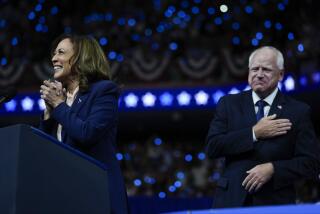Better Safe Than Sorry In Choosing Running Mate
- Share via
WASHINGTON — And so it begins, the quadrennial game of “Guess Who the Vice President Will Be.” Already, short lists are floating everywhere--in the press, at power lunches, all over “official” Washington. Most lists are made up by people who have absolutely no idea who’s really on Bill Clinton’s short list. My guess is that, right now, the governor doesn’t know either.
I am of the school that believes vice presidential candidates rarely help but have enormous potential to hurt. After all, the only times you hear from vice presidential candidates are (1) when they are selected, (2) when they speak to the convention, (3) when they debate Dan Quayle or (4) when they step in deep doodoo. It is this last one Clinton needs to be most attentive to. Only think of Quayle and the problems he caused George Bush, or Geraldine A. Ferraro’s tax and money problems (though, if we had to do it over, I hope Walter F. Mondale would pick her), or Thomas F. Eagleton’s problems for George McGovern. The list goes on.
The best you can hope for out of a vice president is that, in a close race, they can deliver their home state or, in rare cases, bordering states. Let’s forever debunk the ridiculous notion that vice presidential candidates help regionally. There isn’t a single example of this. There are examples, however, of home and border state successes. In 1976, Mondale helped Jimmy Carter carry his home state of Minnesota and also the border state of Wisconsin.
So what does Clinton need to look for in his selection? There is now a debate among Clinton’s advisers, between those who favor an outside, unconventional choice and those who say he needs a more conventional, somewhat inside choice. The outside list would include people like Gov. Mario M. Cuomo of New York and Gov. Ann Richards of Texas. The inside group would include the likes of Sen. Bill Bradley of New Jersey, Sen. Jay Rockefeller of West Virginia and Rep. Richard A. Gephardt of Missouri.
Had Clinton avoided the controversies of draft, drugs and women and, therefore, been in a strong position going into the convention, the unconventional choice would make sense. After all, if you believe the public is in as much of a mood for change as the polls indicate, why not give them a full change package. The problem is Clinton was weakened by past events, which have left the public wondering, “Who is this guy anyway?” Unless repudiated, this is the kind of question that can lead to losing the campaign.
The first significant step to recovery for Clinton is a solid choice for vice president that will have a calming effect on voters. They don’t like Washington, but they also know that it’s not going to go away and that whoever the next President is will need all the help he can get in making government work. Choosing someone from Washington but not of Washington will help Clinton do that.
Outsiders such as Cuomo and Richards, bring assets--but also potential liabilities. Does anyone believe Cuomo would be a supportive and non-controversial No. 2? As for his impeccable political judgment, what about his recent suggestion that Clinton have a peace summit with Jesse Jackson and Sister Souljah! New York politics has finally gotten to Mario.
Richards is intriguing. In a close race, she could help carry Texas; she would help with the women’s vote; she could frame the abortion debate perfectly, and she’s fond of taking on Bush. However, she has some difficult events in her background that the GOP will surely exploit. I am referring to her courageous battle against alcoholism. She has been clean and sober for more than a decade--I admire that enormously--but I have seen Republicans make much worse out of far less. The last thing Clinton needs is to have to take time to defend his vice president against GOP attacks.
Bradley, Rockefeller and Gephardt are all known entities that the press and public view as serious public figures. From this group, Rockefeller would seem to have the strongest assets--former governor from a border state, significant standing in the health-care and education fields and financially secure. But any of the conventional choices would bring stability to the ticket.
The other side of the argument suggests that if Clinton chooses to play it safe, he surrenders the change label. To some extent, that is true.
But regardless of Clinton’s choice, the change label will be his to lose. Will an inside Washington candidate hurt? Maybe. Is it fatal? No. But do the benefits outweigh the cost? Absolutely!
In addition, the Ross Perot factor forces a bit of caution on Clinton’s part because no longer is the choice simply one of providing a contrast to Dan Quayle. Perot won’t make his selection until late summer--leaving Clinton with no clue as to how to contrast his choice with Perot’s. A conventional selection makes this safer.
The inside selection may seem boring and unimaginative, but, right now, what Clinton needs to do is calm voters’ concerns. As it is, if the country elects Clinton, they do so knowing it will be a roll of the dice. Therefore, they would like a little bettor’s insurance; the vice presidential candidate could provide it.
More to Read
Get the L.A. Times Politics newsletter
Deeply reported insights into legislation, politics and policy from Sacramento, Washington and beyond. In your inbox twice per week.
You may occasionally receive promotional content from the Los Angeles Times.










